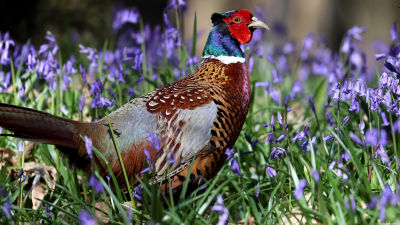Exclusive
Pheasants test positive for avian flu as experts warn against release of millions of game birds

Bird flu has been found in pheasants reared for game shooting, adding to fears that the release of millions of game birds may be helping to spread the deadly disease.
Data from the Animal Health and Plant Agency (APHA) reveals for the first time this year that pheasants in Cornwall, Cheshire and Norfolk have tested positive for the H5N1 virus.
Unconfirmed reports suggest that hundreds of the birds may have died in Norfolk, where a sample of six pheasants tested by the APHA all came back positive.
The Norfolk outbreak is understood to be very close to Royal Society for the Protection of Birds (RSPB) nature reserves.
Earlier this month ITV News reported on the RSPB call for a halt to the release of millions of game birds due to concerns over the spread of avian flu.
Responding to the news that pheasants have now been found with the disease Jeff Knott, the RSPB’s director of policy, said: “To see released gamebirds test positive for avian influenza is incredibly concerning and a further development in what has been the worst outbreak of avian influenza we have ever seen.
"It is currently unclear whether these pheasants caught the disease from wild birds or whether the pheasants were released already infected.
"If the latter then this is an unacceptable risk to our wild bird populations. Defra must provide clarity on what testing has taken place and when.”
Want a quick and expert briefing on the biggest news stories? Listen to our latest podcasts to find out What You Need To Know.
A spokesperson for the APHA said: “We are aware of a number of wild bird deaths in the Buckenham area of Norfolk.
"As part of our ongoing wild bird surveillance programme, we recently published data on a small number of pheasants, which were collected from the area that have tested positive for avian influenza.
"The UK Health Security Agency (UKHSA) has said that avian influenza is primarily a disease of birds and the risk to the general public’s health is very low. Do not touch or pick up any dead or visibly sick birds that you find.”
Dominic Boulton from the Game Farmers' Association - a partner organisation of Aim to Sustain - said: “We are aware of a small number of isolated cases where released pheasants appear to have become infected with Avian Influenza.
"All the available evidence points to these infections being spread by seagulls. Thanks to the vigilance of gamekeepers, strict bio security and support from the gamebird veterinary community, these infections have been prevented from spreading and have not resulted in any significant impact on the populations of other wild birds local to them.”
The pheasant shooting season is due to begin on Saturday, October 1 and millions of birds have been released into the wild because of it.
The coming weeks and months may lead to more positive cases in pheasants and with it more questions about the potential damage caused to the environment.
ITV News has approached the individual understood to own the land where the pheasants with avian flu were discovered, but so far they have not responded.